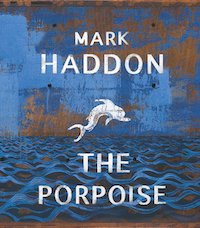When The Curious Incident of the Dog in the Night-Time was published in 2003, it quickly became a smash hit, winning numerous awards and selling millions of copies. The idiosyncratic voice of its autistic narrator enraptured young and old readers alike, and in 2012 it was turned into an equally successfully play written by Simon Stephens. Yet Mark Haddon’s subsequent novels – A Spot of Bother (2006) and The Red House (2012) – failed to make the same waves. Haddon will be hoping, therefore, this his new work, The Porpoise, can escape from under the shadow of The Curious Incident.
In a one-hour discussion with the British writer Charlotte Higgins at this year’s Edinburgh International Book Festival, Haddon read an extract from the beginning of The Porpoise, which is loosely based on William Shakespeare’s play Pericles. The Porpoise is self-consciously grander in scale than his earlier works, packed full of literary and classical allusions and jumping around in time and space. It begins with a plane crash, in a vivid account which left some audience members audibly gasping.
 The talk, which was interpreted into British Sign Language by Linda Duncan, was an enjoyable exploration into Haddon’s humorous, at times morbid imagination. Haddon also took great delight going into detail about his recent triple heart bypass. Charlotte Higgins and the audience reacted in baffled amusement alike at Haddon’s account of how he broke the news of this surgery to his teenage boys.
The talk, which was interpreted into British Sign Language by Linda Duncan, was an enjoyable exploration into Haddon’s humorous, at times morbid imagination. Haddon also took great delight going into detail about his recent triple heart bypass. Charlotte Higgins and the audience reacted in baffled amusement alike at Haddon’s account of how he broke the news of this surgery to his teenage boys.
Haddon confessed to not particularly liking Pericles, which Shakespeare co-wrote with George Wilkins, and The Porpoise acts as an interrogation of the Jacobean play. Both Haddon and Higgins were wary to reveal many plot details, lest they spoil the novel for those yet to read it. Copies can be picked up in the Book Festival’s two bookshops, and Haddon obliged audience members with a book signing session.
There was also a question and answer session at the end of the talk, with a few audience members posing questions about The Curious Incident of the Dog in the Night-Time, for instance what Haddon’s inspiration for it was. Haddon responded by saying that there was no single inspiration, but rather several, including a book of Wittgenstein’s lectures and conversations.
He also compared the mind of a writer to the Millennium Falcon, but said that he is for the most part wandering in the dark when he writes, rather than following a strict structure, like some writers claim to do. It’s clear from this event that Mark Haddon is not just a one-hit wonder: His clever, funny mind makes him one of the UK’s sharpest writers, and it’s exciting to reflect on what other innovative works he has in him.
- The Ocean at the End of the Lane @ National Theatre - 8th January 2020
- Never Look Away (2019) - 21st July 2019
